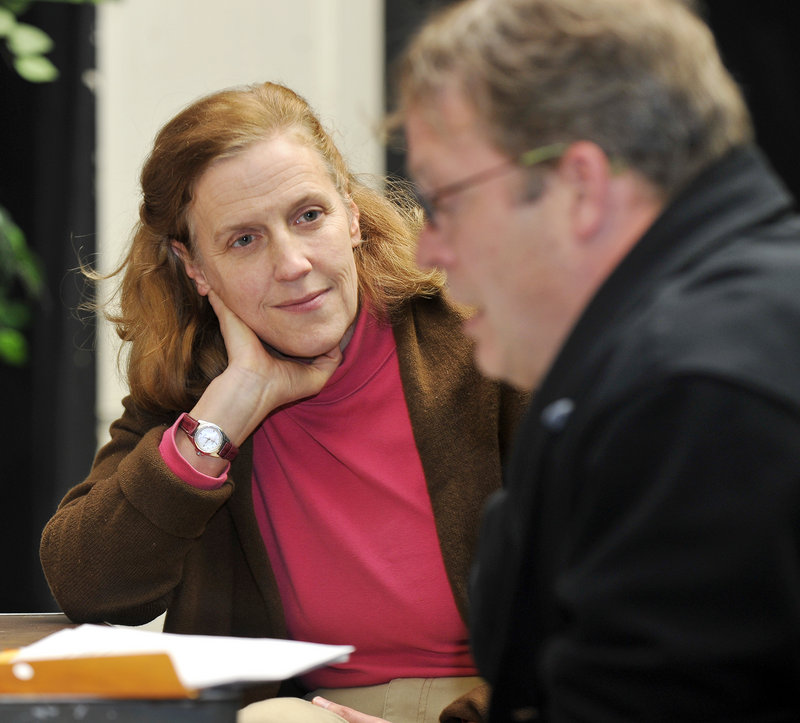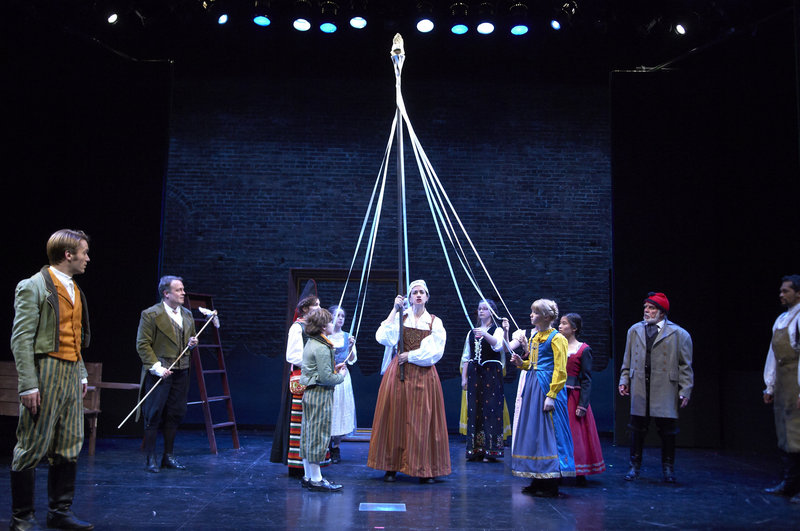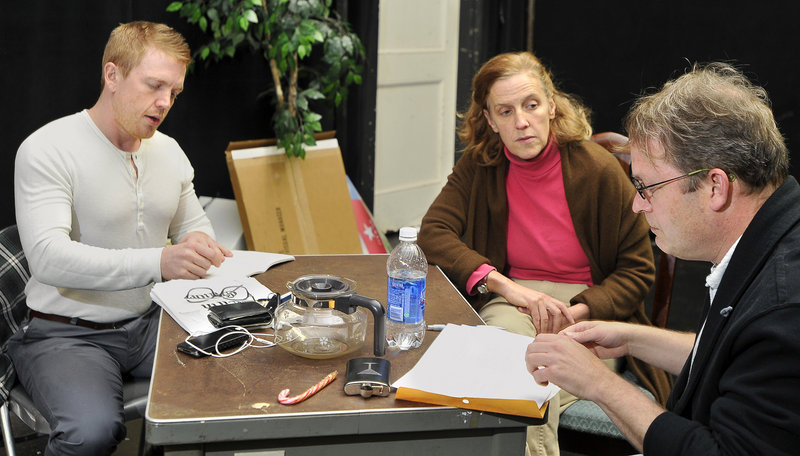Anita Stewart produced her first play at age 5. It was a neighborhood production of “Little Red Riding Hood,” which she hosted in her parents’ garage.
She has little recollection of the show itself, but remembers her mother rewarding her with raisins afterward.
She’s come a long way. Stewart, now 50, is artistic and executive director of Portland Stage Company. Under her leadership, Portland Stage has evolved into a top-flight regional theater company, routinely producing shows full of artistic merit while also filling the theater’s 288 seats.
Stewart assumed dual leadership roles at the theater five years ago after concentrating solely on the artistic side of the operation for nearly a decade. She counts among her accomplishments a balanced budget and growth in the theater’s education programming.
At the same time, she’s maintained a standard of artistic excellence that translates into interesting and oftentimes unlikely shows that attract playwrights, actors and directors with national credentials.
“I’ve always liked doing this,” Stewart said. “I wish there was more time to do more. But this is all I have ever really wanted to do.”
Dual responsibilities during challenging economic times mean Stewart works long days to give proper attention to both parts of the operation. Overseeing a theater with a $2 million budget and an in-season staff of three dozen, not including the actors, presents daily challenges.
“With Anita, it’s not just what happens on stage. It’s the cookie behind the bar,” said Andrew Harris, the theater’s production manager. “She recognizes the importance of the entire operation. There are times when she doesn’t want to know that the elevator is stuck, but it’s an important factor and a big part of her success.”
At no time in recent years has Stewart left a larger artistic stamp than the current holiday production of “The Snow Queen,” on stage through Christmas Eve. In addition to directing this Hans Christian Andersen fairly tale, Stewart also wrote the adaptation and designed the set.
The production represents her complete artistic vision, beginning with the conception of the show itself, the writing of the script, the hiring of the cast, the look and actual design of the set and the action on the stage. She had a lot of help – everything that happens at Portland Stage is a result of collaboration – but “The Snow Queen” is her vision all the way.
The successful execution of her vision is evidenced by the show’s sold-out run. Virtually every ticket for every show was sold in advance.
“Having the opportunity to create something like ‘The Snow Queen’ is a satisfying experience for me as an artist,” she said. “To take an existing piece of work and respond to it and then create a new piece of work that has a wholeness to it, that to me is the meat of it. That is what I most enjoy doing.”
NOT BY DESIGN
Stewart did not go to school to train as a theater artist. She grew up in upstate New York, in Pittsford near Rochester. (Interestingly, another Maine theater mainstay, David Greenham, formerly of the Theater at Monmouth, also grew up in the same town at the same time, though Stewart says they did not know each other as kids. They attended different high schools.)
Stewart attended Yale University in New Haven as both an undergraduate and graduate student. She began as a history major, and switched to architecture.
Looking back, she thinks she probably never intended to become an architect. That world seemed to hold two career paths: One would involve becoming a superstar architect and designing big buildings that would stand hundreds of years. The other route likely would result in a desk job designing drab office spaces or strip malls.
Neither appealed to her. The former option struck her as pretentious; the idea of building something to last forever seemed wrong on many levels. And strip malls bored her. Instead, she used the skills she learned as an architect in her theater pursuits.
Although Stewart appeared on stage as part of her theater studies at Yale, she never felt comfortable on stage. She always felt more at ease behind the scenes, making things happen. She loved the collaborative process, and particularly enjoyed building sets and figuring out how to make the best use of space.
Those skills remain Stewart’s greatest asset today, said Bryon Winn, director of theater at the University of Iowa in Iowa City and a frequent collaborator with Stewart at Portland Stage. Winn designed the lights for “The Snow Queen,” and will design several other shows this season for the theater company.
“You look at her scenic designs, and there is something about them. The way she thinks about them, they are not clever for clever’s sake, but they are brilliant in the way she pulls them all together,” Winn said.
“There is great artistry to her work, but also poetry in the technical way that her designs work together.”
In “The Snow Queen,” Stewart created multiple sets for many different magical worlds. It was a huge technical challenge, Winn said, because of the limited backstage space.
Her designs not only had to work artistically to help tell the story, but they had to be technically proficient. She might not have accomplished either if not for her training as an architect, he said.
Frank Butler, production manager at the Guthrie Theater in Minneapolis, has hired Stewart on a freelance basis many times. The Guthrie is among the best-known and most highly regarded theaters in the country. It’s a testament to Stewart’s skills that she is asked back, Butler said.
“Anita has a stellar reputation in the business of being a successful collaborator,” Butler wrote in an e-mail. “I can put her on a show with a director for the first time and expect them to love working with her.”
Many years ago, Butler hired Stewart to work with “an eccentric Romanian director” who challenged everybody with his rage and poor communication skills.
“Anita was practically the only person who could draw out of him the necessary information to do the show,” Butler wrote. “She also acted as a buffer when he would lose it. I worked with the same director years later and found out just how valuable her communication skill and ‘bedside manner’ was.”
Stewart blushes at the praise. “I am not brilliant at anything, but I am very good at a lot of things,” she allowed. “That is what makes me able to do this job.”
PERPETUAL MOTION
As executive and artistic director, Stewart is responsible for the total operation of Portland Stage. She attends board and budget meetings, and travels to New York a half-dozen times a year to hire actors and directors for shows in Portland. She oversees a staff of 24, most of whom work part-time, as well as an intern team of 11.
This week, while “The Snow Queen” winds down, Stewart looks ahead. She will write thank-you notes to donors, and draw sketches for the next show, “Trouble Is My Business,” which opens in late January.
She will pause for Christmas, which she will celebrate with her husband and two children at their home on Munjoy Hill. And on Dec. 26, she will begin rehearsals for “Trouble Is My Business.” Soon after that, she will travel to New York to cast a spring show.
There is little time to pause.
Paul Mullins, a New York director, comes to Portland Stage once a year as a freelance director, and will be back later this season to direct the play “Heroes.” He travels all over the country for his work, and Portland remains one of his favorite destinations.
“She runs a really great theater,” Mullins said. “Everybody there does a really fine job at what they do, and that says everything about her leadership. She is a great collaborator. At its best, theater is a collaborating thing. A bunch of people get together, and you work on something that is unlike what any one person would create.”
That’s a lesson Stewart began learning as a young girl, when she recruited neighborhood kids to act in a tiny little play in her tiny little garage.
Winn said Stewart’s love affair with theater is obvious, and it comes through in the quality of work and level of dedication among the people working for her.
“There seems to be a philosophy surrounding Portland Stage: What do we need to do to make the show better within the resources that we have? We are not done until the very last minute, and we will do everything within our power to make this the best experience for the people of Portland,” Winn said. “People are proud of their work there.”
Staff Writer Bob Keyes can be contacted at 791-6457 or:
bkeyes@pressherald.com
Twitter: pphbkeyes
Send questions/comments to the editors.





